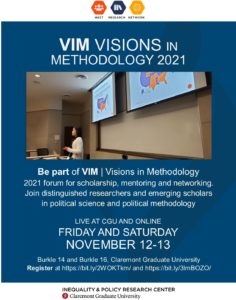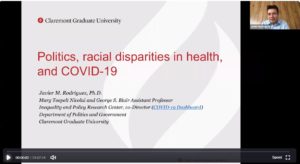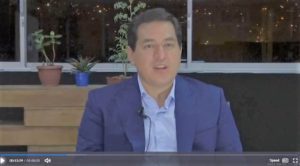Conferences (2023 – 2024)
August 30, 2023 – Local Political Economy Conference (Pre-APSA Conference 2023). For more information, visit here.
Conferences (2021 – 2022)
April 22, 2022 – Class and Inequality Conference (co-organized with the UC Riverside School of Public Policy). For the conference program and Zoom registration, visit here.
June 3, 2022 – The Fifth Conference of the California Workshop in Empirical Political Science (CaliWEPS V). To apply, visit here.
November 11 – November 13 – 2021 VIM | Visions in Methodology Annual Conference. For more information, visit here.

Workshops (Spring 2022)
May 27, 2022 – Job Market Workshop, session 1: “Portfolio, Interviews and Alt-Ac Jobs” (with UC Riverside)
August 26, 2022 – Job Market Workshop, session 2: “Job Market Paper Presentations” (with UC Riverside)
Research Webinars (Spring 2022)
IPRC Research Webinars are bi-weekly meeting of faculty and graduate students, featuring leading researchers in political science and connecting CGU emerging scholars to networks.
Location: Online – Zoom
Time: Wednesdays, 11 am – 12 pm
February 16 – Jack Santucci, Ph.D., Drexel University, “More Parties or No Parties: The Politics of Electoral Reform in America”
March 2 – Soomi Lee, Ph.D., University of La Verne, “Emergency Loan Distribution through Regional Banking Markets: Examining the Paycheck Protection Program during the COVID-19 Pandemic”
March 23 – Tyler Reny, Ph.D., Claremont Graduate University, “How Vulnerability Shapes Climate Policy Attitudes: The Case of Rising Sea Level” (with Andrew Reeves and Dino Christienson)
April 6 – Michele Ver Ploeg, Ph.D., George Washington University, “Policy Research in the Federal Government”
April 20 – Yesola Kweon, Ph.D., Sungkyunkwan University (Korea), “Why Do Young Men Oppose Gender Quotas? Group Threat and Backlash to Legislative Gender Quotas”
For abstracts, please visit here.
Conferences (2019 – 2020)
Politics and Policy of Health Symposium – February 7, 2020. For more information, see program and flyer.
The 2019 Southern California Comparative Political Science Conference (SC2PI-XIII) – September 13, 2019. See program here.
The 58th Meeting of Politics of Race, Immigration, and Ethnicity Consortium (PRIEC) – March 29, 2019. See program here.
Research Talk Series
Our Research Talk Series is a biweekly meeting of faculty and graduate students. The meetings are a space for research conversation, presentations of current research, and trainings on topics related to inequality and research methodology.
Fall 2020
September 17 – Javier M. Rodriguez, Ph.D., IPRC Co-Director, Claremont Graduate University, “Politics, COVID-19, and Racial Disparities in Health” (Webinar recording)

October 1 – Aldo Yanez-Ruiz, Ph.D., Cal State Los Angeles, “Political Candidate Job Titles & Voter Perceptions: Evidence from Two Online Experiments”
October 15 – Melissa Rogers, Ph.D., IPRC Co-Director, Claremont Graduate University, “Voting Your Pocketbook or Voting your Place: Decomposing Variance in Economic Voting” (with Dong Wook Lee)
November 5 – Roya Talibova, Ph.D. candidate, University of Michigan, “Fighting for Tyranny: How State Repression Shapes Military Performance” (with Arturas Rozenas and Yuri Zhukov)
November 19 – Gabriele Magni, Ph.D., Loyola Marymount University, “Boundaries of Solidarity: Immigrants, Economic Contribution, and Welfare Attitudes”
Spring 2020
January 29 – Mark Hoekstra, Ph.D., Texas A&M University, “The Effect of Police Officer Race on Use of Force”
February 26 – Stephen El-Khatib, Ph.D. candidate, UC Riverside, “The Muslims Next Door”
The presentation investigates hostility toward mosques and Muslim Americans in the United States, both through physical attacks and subtle racism. I challenge existing theories related to outgroup contact and threat, against the theory of outgroup institutional context. I postulate that outgroup related buildings and developments such as mosques are seen by some residents as threatening footholds in their community. To test my theory, I developed a Cooperative Congressional Elections Study module on Muslims and mosques in 2018, created a series of datasets which scrape online information on hate crime, and utilized U.S. Internal Revenue Service data to determine the locations of mosques throughout the country. I find that the presence of mosques is significantly related to increases in hate targeting Muslims, whereas the relative size of Muslim populations is not.
March 11 – Barbara Junisbai, Ph.D., Pitzer College, “Patronage Norms in Post-Soviet Eurasia: The President, the First Family, and Intra-Elite Conflict”
In studies of post-Soviet politics, patronage is often described as the ‘glue’ binding presidents and elites and creating powerful material incentives to uphold the status quo. With one hand, the president rewards loyal elites, giving them access to ‘the fruits of office’ and other valued resources; with the other, the president punishes wayward elites, taking away whatever benefits they have accumulated and closing off access to future ones. In this talk I reconsider patronage, moving away from primarily material conception to a normative one. If we think of patronage as an institution, we are presented with an opportunity to explore in a systematic way the rules and expectations governing the material aspect–‘who gets what, how’ and how much–of patronage in personalist regimes.
Fall 2019
September 25 – Gregory Deangelo, Ph.D., Claremont Graduate University, “Police Response and Severity of Crimes”
October 2 – Ahu Sumbas, Ph.D., Hacettepe University, “Women’s Substantive Representation in the Local Politics of Turkey”
October 9 – Nicholas Weller, Ph.D., and Michelangelo Landgrave, Ph.D., UC Riverside, “Do More Professionalized Legislatures Discriminate Less? The Role of Staffers in Constituency Service”
October 23 – Christopher Krewson, Ph.D., Claremont Graduate University, “From a Standard to a Rule: Changes in the Flexibility of Legal Doctrine”
November 6 – Stan Oklobdzija, Ph.D., Post-Doctoral Fellow, Claremont McKenna College, “Citizens United, Dark Money Networks and the Evolution of Political Parties”
November 20 – Rena Salayeva, Ph.D., Post-Doctoral Fellow, Claremont Graduate University, “Strategies for Mobilizing and Rewarding Russian Voters”
Fall 2021 IPRC Events
September 8 – Alma B.Calderón, Ph.D., Whittier College, “The Spillover Effects of Mining: The Case of the DRC”
September 22 – Manisha Goel, Ph.D., Pomona College, “Firms of a Feather Merge Together: Caste Proximity and Merger and Acquisition Outcomes”
October 6 – Justin Freebourn, Ph.D. candidate, UC Riverside, “Policy Solidarity: Conceptualizing and Measuring the Cognitive- and Institution-Centered Facets of Fiscal Policy Preferences as Theoretical Determinants of Macroeconomic Performance for Neoclassical Social Science”
October 13 – Tanu Kumar, Ph.D., William and Mary’s Global Research Institute, “How the content of claims shapes government responsiveness: theory and evidence from Mumbai”
October 20 – Maricruz Osorio, Ph.D. candidate, UC Riverside, “Community versus the Self: Immigrant Women’s Political Motivations”
November 3 – Carlos Algara, Ph.D., Claremont Graduate University, “The Severity of COVID-19 and Republican Party Fortunes in the 2020 Elections: The Semblance of a Down-Ballot Presidential Spillover” (with Sharif Amlani, Samuel Collitt and Sara Kazemian)
December 1 – Jonathan Purtle, Ph.D., Drexel University, “Empirical Methods to Study Policymakers and the Contexts in Which They Make Decisions”
Spring 2021 IPRC Events
Special Events
April 1 – Conversation with Andrés Arauz, candidate for president of Ecuador, discussing the country’s political, social, and economic future, with a focus on human potential (co-sponsored with Soka University of America). Event flyer. Link to the web recording is available upon request (email: iprc@cgu.edu).

Research Webinars
February 19 – Jessamyn Schaller, Ph.D., Claremont McKenna College, “Children’s health insurance coverage and health expenses after parental job loss: Are families landing in or falling through the safety net?” (with Chloe N. East, Elira Kuka, and Mariana Zerpa)
March 4 – Dean Robinson, Ph.D., University of Massachusetts Amherst, “Topic: Health Disparities by Race and Class: Why Both Matter”
March 25 – Kristin Lunz Trujillo, Ph.D. candidate, Carleton College, “Decoupling Rural from White Working Class: The Role of Class and Local Economy in Rural Residency, Rural Identity, and Right-Wing Support”
April 8 – Jiin Jung, Ph.D., University of Kansas, “Cultural Drift, Indirect Minority Influence, Network Structure and Their Impacts on Cultural Change and Diversity” (with Aaron Bramson, William D. Crano, Scott E. Page, and John H. Miller)
April 22 – Joseph Dietrich, Ph.D., Claremont Graduate University, and Jamaica Baccus-Crawford, Claremont Graduate University, “Yazzie et al. v. Hobbs: The 2020 Election and Voting by Mail on and off-Reservation in Arizona” (with Jean Reith Schroedel, Claremont Graduate University, and Kara Mazareas, Claremont Graduate University)
April 29 – Robert Klitgaard, Ph.D., Claremont Graduate University, “Overcoming Ethnic Inequalities: Some Lessons from Developing Countries”
You can find our previous events at this link: